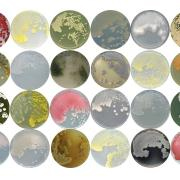To commemorate World Soil Day and to campaign on the theme “Keep Soil alive, Protect Soil Biodiversity” MSSRF organized a webinar on 3rd December 2020. The webinar aimed to create awareness on the importance of maintaining healthy soils by addressing challenges in soil management and prevent soil biodiversity loss to proactively improve soil health.
It is vital to preserve the soil biodiversity which includes a myriad organism: micro-organisms like bacteria, fungi, protozoa and nematodes, meso-fauna such as nematodes, mites and springtails, as well as macro-fauna earthworms and termites. All of these acts as primary driving agents for enhancing nutrient cycling, regulating the dynamics of soil organic matter, soil carbon sequestration and greenhouse gas emission etc. In addition they contribute to the plant growth and reduce yield gap.
Prof D J Bagyaraj, Chairman of Centre of Natural Biological Resources and Community Development, Bangalore, spoke about the diverse macro, meso and micro fauna dwelling in the soil and its role in the ecological functions and industrial importance. He also spoke about the “Global Soil Biodiversity Atlas” which illustrates the diversity of soil organisms, explained their geographical and temporal distribution, the ecosystem functions and services provided by soil biota and more importantly, the myriad of threats to soil biodiversity. Dr M Madhu, Head and Principal Scientist of Indian Institute of Soil and Water Conservation (IISWC), Odisha spoke about natural resources management practices to enhance productivity for field level functionaries, soil erosion control, and enhancing carbon sequestration. He highlighted that interventions such as mixed cropping systems, conservative furrow contribute to soil moisture conservation and significantly protect soil health and its biodiversity.

Dr V Srinivasan, Principal Scientist, Soil Science Division, Indian Institute of Spice Research, Kozhikode, spoke on soil health and crop disease management practices for increasing productivity in spices. Intensification of spices cultivation significantly impacted soil micronutrients, crop growth and yield. An in-house capsule formulation of Biofertilizer and biopesticide has been developed by IISR, which exhibits greater potential for better management of the crop disease compared to the existing powder and liquid formulations. Dr V R Prabavathy, Principal Scientist, MSSRF, spoke about the role of root-associated microbiome in soil and plant health management. She highlighted the various steps involved in isolation, characterization, field testing and commercialization of the identified strains, demystification of production technology and technology transfer to Women self-help groups, particularly rural women farmers for income generation. Around 25 scientists and young professionals involved in the project participated and benefited from the webinar.
This event reiterated the World Soil Day campaign, Keep Soil alive and Protect Soil Biodiversity. Thus, maintaining soil biodiversity, an important regulator of agro-ecosystem functions, not only improves sustainability of production systems, but also meets the consumer needs to produce high quality and safe food.
About:
The “Biotech-Krishi Innovation Science Application Network (Biotech-KISAN)–a mission programme of Department of Biotechnology (DBT), Govt. of India, New Delhi aims to establish Biotech hubs across India. The MSSRF-DBT-Biotech KISAN hub project is implemented in the aspirational districts of Eastern plateau and hills in Odisha and Western Ghats in Kerala with a focus to promote eco-friendly technologies for improving the farming practices, sustainable use of soil and water to enhance soil health and to create access to rural processing technologies, value addition and market. This project is executed by MSSRF in partnership with Indian Institute of soil and water conservation (IISWC), Sunabeda, Odisha and Indian Institute of Spices Research (IISR), Kozhikode, Kerala.
Written by: Prabavathy V R & Biotech KISAN Hub team
Edited by: Jayashree B

